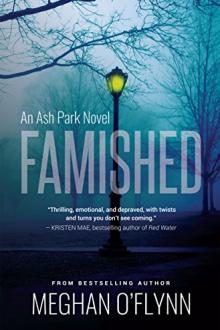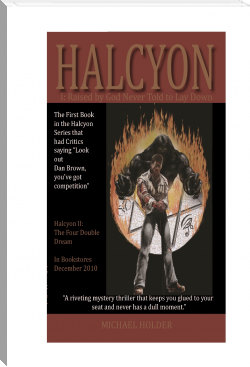Famished - Meghan O'Flynn (learn to read books TXT) 📗

- Author: Meghan O'Flynn
- Performer: -
Book online «Famished - Meghan O'Flynn (learn to read books TXT) 📗». Author Meghan O'Flynn
Robert raised his sightless eyes to the heavens and smiled.
She lay on the couch, arm extended, palm open to the sky as if she were begging for something. A needle hung from one swollen vein. He wondered if it would eventually rip free. If he stayed there long enough, he might get to watch it happen.
He knelt in front of her. She stared at him, unfocused, unseeing, not really there at all. In a way, she never had been.
A white crust clung to her blue lips, and a slippery trail of vomit ended in a milky puddle on the floor. Her chest rose and fell, again and again. Much too fast, much too shallow.
He touched her hand. Cold.
A single tear trailed a path down her face. He traced it with his finger.
He did not cry. He did not understand the gesture. As if watery eyes made bad things any less terrible. Not that this was bad.
He looked at the Mickey Mouse watch he had found, dropped by some john, the only thing that was just his. Twelve minutes, he guessed; it would take twelve minutes before she stopped breathing altogether. That was seven hundred and twenty seconds. Most five-year-olds did not know their multiplication tables, but he did, from counting out baggies of drugs and figuring out how long it took for her to sleep off a hit. It was safer to be hidden before she woke up.
He pulled a banana from a bag on the table, the latest delivery from the church outreach. They smelled even better now that he would not have to share them. Her breath quickened, then slowed abruptly. He peeled the fruit and counted out the seconds in earnest.
Five hundred and forty-two, five hundred and forty-three—
The life drained from her in a matter of seconds. He watched her eyes, trying to catch a glimpse of…something. But there was nothing. She was no less dull in death than she had been in life.
He sighed. Off by one hundred and seventy-seven seconds. He hated to be wrong, even if it was not by much. Perhaps eventually, if he practiced enough, he would get better at guessing things like that.
He took a bite of the banana and walked to the bathroom. It would be a few days before anyone noticed her missing. Probably around four days, six hours, and forty-six minutes. He calculated the day and time he expected the first knock at the door and wrote his guess in eyeliner on the bathroom mirror so he would be reminded of his success…or failure. He dropped the pencil in the sink—
And awoke.
He turned to the clock. Five oh five. Thirty-five minutes before the alarm. Too late to go back to sleep. He might as well get up and make coffee.
In the kitchen, he scooped grounds into the espresso machine, blinking sleep from his eyes. A pillow of steam escaped with a raspy whisper.
What a strange dream. Or memory. Not that it mattered.
They had shielded his eyes when they removed him from the apartment, though any idiot would know he had already seen it. By then, his mother’s body had been a nest of ants on the damp, putrid sofa; even the bodily fluids had stopped leaking onto the untreated floor, though he had been surprised by how long that part had taken. Three days, four hours, six minutes.
The car ride to the hospital had taken twenty-four minutes. When they arrived, men in white coats tore the watch from his hand and forced him onto a bed. He had fought violently until a sharp prick in his buttocks made him slip away into nothingness.
Three days, twelve hours, and thirty-two minutes later, he escaped from his room and fled down the maze of hallways. When the trailing footsteps got too near, he ducked into a room in a dark back corner. The woman in the bed had reached for him, zombie-like. He’d watched, fascinated.
From the chair, a man’s voice, not like his, but like his all the same. “That was a hug.”
He did not respond, just watched the man with the buzz cut.
“My wife loves to hug. She likes to do a lot of things that never made sense to me. Her face was an open book that I couldn’t read. I understand now, though.”
He and the man stared at each other, playing a silent game of wits.
“You don’t get it either,” the man said simply. “We’re not like other people.”
He looked at the man’s shoes. They were the shiniest things he had ever seen.
“You’ll learn,” the man told him.
The orderlies discovered him asleep in the chair next to the woman and took him back to his room. Twenty-six hours and five minutes later, the man appeared at his bedside.
“My wife’s dying,” the man said.
They listened to the beeping of the heart monitor.
“Your mom’s already dead.” The man pulled a chair to the side of his bed. “You’re on your way to foster care. I hear it’s a pretty awful place.”
Beep… Beep… Beep…
“So what did they do to you when you got here? Strip your clothes? Take your things?”
Beep… Beep… Beep…
The man nodded. “You don’t feel a thing, do you?”
Beep… Beep… Beep…
“I understand. It works wonderfully in the military, being numb enough to shoot the enemy in the face or leave your comrade behind. But you need to use it differently out here.”
“How?” His own voice sounded foreign after so many days spent in silence, avoiding the questions of the hospital staff.
“You’ll learn,” the man said again. “People like us always can.”
The man sat in the chair for one minute and twenty-two seconds before he spoke again. “Would you like to hear a story to pass the time? It was my wife’s favorite.” The man opened the small brown book in his lap without waiting for a reply.
“The Walrus and the Carpenter
Were walking close at hand;
They wept like anything to see
Such quantities of sand:”
He closed his eyes and tried to pretend he was free and walking along the beach, or even just along the sidewalk. Anywhere but this place where he had no choice but to bend to the will of those larger and stronger.
“‘O Oysters, come and walk with us!’
The Walrus did beseech.
‘A pleasant walk, a pleasant talk,
Along a briny beach:’”
Maybe one day he would see sand, ocean, waves.
“‘It seems a shame,’ the Walrus said,
‘To play them such a trick.’”
The oysters were idiots to follow the walrus in the first place, he had thought. They deserved what they got.
Three days, twelve hours, and thirty-two minutes after his hospital admission, he had run into Linda Harwick’s hospital room. Six days, four hours, and eight minutes later, he went home in the custody of Rupert Harwick. That period was the most vital nine days, sixteen hours, and forty minutes of his life.
A final belch of steam poured from the espresso maker. Dominic grabbed a cup from the cupboard, poured a steaming mug, and finished it with a squeeze of lemon.
His footsteps were nearly soundless on the stairs. The upstairs rugs swallowed the tap of his slippers. In the bedroom, Hannah lay sprawled out on her stomach, the sheets pulled up to the middle of her back, her arms in disarray.
Like a common drunk, he thought. He noted the way her hair lay on her back in disordered waves, rising and falling as she drew breath.
He thought of Linda Harwick, her stiff form, the casket, the guilt-ridden mourners. Unlike his own mother, whose death had been of no consequence to anyone, Linda had apparently been useful to many, including her husband.
Marrying Hannah could work. That might be more useful in the future.
But not nearly as much fun as watching her bleed.





Comments (0)